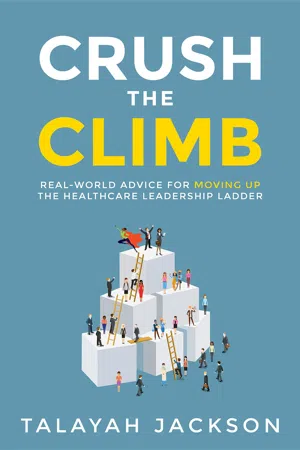![]()
Part I
Confront the Ladder
Healthcare is a meaningful field with many growth opportunities. Being in a management or leadership role means additional pressure to lead individuals to exceptional performance. Climbing the first rung of the healthcare ladder means doing the hard work to understand yourself and others. Check yourself and your internal motivators for wanting a healthcare career. Learn how to tune into the motivations of your staff and peers to build authentic relationships that will propel you up the ladder.
![]()
1
Get Real with Yourself
“Being entirely honest with oneself is a good exercise.”
—Sigmund Freud
Rule for the climb: The opportunities in healthcare management are increasing, as is the need for competent, authentic, and innovative leadership. While the rewards may be great, the realities are daunting. On a daily basis, you will face challenges and decisions that your peers and friends working in other industries likely have no understanding of. A career in healthcare management is a marathon, not a sprint. Be clear on your motivations for being in the industry and be prepared to stay in it for the long haul.
Thanks to unprecedented growth in the healthcare industry, jobs in healthcare management are on the rise. According to Healthcareers.org, approximately 300,000 people hold administrative positions in healthcare—from middle managers to CEOs. Today, there are more jobs in healthcare management than ever before. But are you right for the job that needs to be done? Jobs in healthcare management offer a tremendous amount of growth and opportunity, but being the leader of a healthcare organization is not for the faint of heart—it takes guts and a servant-leader mindset.
According to a study published by the journal of Nursing Administration1, the changing dynamics of today’s healthcare system require leaders to be increasingly innovative in how they approach their daily functions and responsibilities. As a healthcare manager, you will face time and resource constraints, as well as the challenge of embracing innovation in your organization. As if being continually innovative isn’t enough, you’ll need to continually develop yourself to get the best out of the people who work for you.
When I first became a healthcare manager, I quickly realized that being a good leader takes time and practice, and learning from your mistakes. Each of my positions has challenged me and forced me to grow in different ways—even uncomfortable ways. What I held onto throughout my career was the understanding that passion and commitment are baseline requirements for being an effective healthcare leader.
Career Gut Check
If you are a student or early career professional, I strongly advise you to be real with yourself about your motivations for being in healthcare, particularly management. The most common response I hear from students and junior professionals is, “I want to help people.”
If that is your reason, I challenge you to go deeper because “I want to help people” is the easy answer. It’s an answer that doesn’t require much thought and shows limited awareness of the realities of the healthcare industry because there are a lot of other career fields in which you can help people, such as customer service or retail.
Do a serious gut check and ask yourself:
Why am I interested in healthcare management?
Is healthcare my passion? Can I dedicate my entire career to working in this field?
If money wasn’t a concern, would I still pursue a career in healthcare?
Question your true motive. Is it prestige? Money? Hopefully, your motivation isn’t money, because you’ll likely start at the bottom of the ladder right out of school and have to work your way up. Most entry-level healthcare managers, administrators, and consultants earn $65,000 - $75,000 per year2.
Is healthcare management your next best alternative to being a doctor because you didn’t get into medical school? Maybe the thought of operating a hospital or doing consulting work for a healthcare organization sounds 1,000 times better than being a doctor. Trust me, I’ve heard it all and had some of the same thoughts myself.
What you’re thinking and feeling now as you prepare to graduate from a health management program or start your first job is no different from what I (or anyone else who came before you) thought or felt. Whatever your reason for choosing healthcare, particularly management, be clear about your why.
The Healthcare Leadership Revolution
Organizations are always looking for good talent, and many are willing to invest in candidates who have the potential to be great leaders. According to the Smartblog on leadership3, a leadership revolution is coming: “Implementing a new strategy requires current and emerging leaders who can drive an organization, energize its operations and inspire its people. This kind of leadership challenge is for the select few who always step up, build a competitive edge, and differentiate themselves in clear and compelling ways.”
It’s a daunting responsibility to be a healthcare leader, so always remember why you want to be in the field. Keep your vision and your passion at the center of everything you do.
It’s a daunting responsibility to be a healthcare leader, so always remember why you want to be in the field. Keep your vision and your passion at the center of everything you do. There will be long, trying days and days when you will want to quit (I did—and that’s ok). Stay real with yourself—know when something isn’t right for you and when to walk away or when to stay, even if it’s tough. Stick to your vision for your career and trust your gut. Most importantly, identify what you care about most in healthcare and pursue it with all your energy. Don’t settle for any position just to “get your foot in the door” because you may get stuck there.
Gearing up for the climb: Whatever your reason for wanting a career in healthcare management, be very clear with yourself about why you are entering this field. You should be able to articulate your motivation, your interests, and your passion to others—particularly individuals who are offering you opportunities.
![]()
2
Check Your E.I. at the Door
“What really matters for success, character, happiness and lifelong achievements is a definite set of emotional skills – your EQ – not just purely cognitive abilities that are measured by conventional IQ tests.”
— Daniel Goleman
Rule for the climb: Emotional Intelligence (E.I.) is one of the most important aspects of leadership, particularly in healthcare. Emotional Intelligence means knowing how to manage yourself and relate to others. You should be sure you have a firm grasp on your E.I. before—not after—starting a position, and even before you set foot in the door.
According to an article by Becker Hospital Review4, Emotional Intelligence is a set of behavioral competencies, distinct from traditional IQ, that impact performance. The role of E.I. competencies is becoming increasingly important as healthcare becomes focused on patient-centered care and improving health outcomes.
The Value of High E.I.
From the first day on the job, you need to “check your E.Q.” at the door and be aware of behaviors and emotions you are bringing to your job. For example, are you a hothead who easily gets upset in certain situations? Are you able to relate and engage with people who are different from you? These are important questions to ask yourself before you take a management position. One of the most difficult things about being a leader is continually exhibiting a high level of E.I. No matter your position, the importance of E.I. cannot be ignored.
I’ll tell you a story to illustrate my point. At the age of seven, my brother was diagnosed with juvenile diabetes. He was in good health throughout his childhood, but in his mid-20s, he began experiencing complications associated with his disease. The physician who cared for him at the time was Dr. Edoe. Edoe was recognized as one of the top endocrinologists in the city. He frequently traveled to speak at national conferences, conducted breakthrough research trials in his office, and published his findings in the best medical journals. Despite his accomplishments and medical knowledge, I found that Dr. Edoe was lacking in the E.I. department.
One week, my brother had an important appointment at Dr. Edoe’s office; he was receiving results of some recent lab work, so my mom and I decided to join my brother for moral support. We sat with the other patients in the waiting room, flipping through outdated magazines and casually watching the midday gameshows loudly playing on the television.
While much of the visit up to this point had been routine, we knew that day would be different because my brother was going to see Dr. Edoe himself. Although my brother had been going to Dr. Edoe’s office for years, he had interacted only with Dr. Edoe’s physician assi...

